Windhoek – Ghanzi, Kalahari, Botswana (500 km) (LD) (camping)
You will be collected between 07:30 & 08:00.
We drive to our wilderness bush camp, which is based on a local farm in the Kalahari, near Buitepos Border, via the eastern village of Witvlei. On arrival we set up camp, enjoy a relaxing afternoon, wait for the sun to set and enjoy a fire cooked dinner and the tranquility of an evening in a remote wilderness environment. Included activity: Bushman dancing.


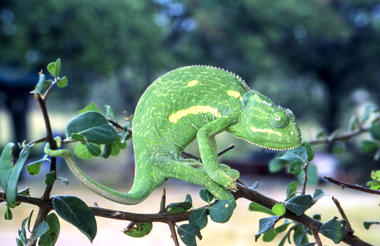
Ghanzi – Guma/Okavango Delta (450 km) (FB) (camping)
An early start and a quick stop in Ghanzi to collect any last minute supplies before continuing east and north, traversing the linear dunes of the Kalahari and passing through small towns along the way. A change in vegetation heralds our arrival on the very western edge of one of the natural wonders of the world, the Okavango Delta. Here we turn north for some way before again pointing our wheels west as we enter the Delta proper. We see our first glimpse of the crystal waters through the lush vegetation and we make our camp on the banks of a pristine African lagoon.
Day 3 - Okavango Delta (FB) (camping)
Included activity: We are in the territory of the River People, so this morning we leave our vehicle behind and travel in a more appropriate fashion, first by motor-boat and then by traditional Mokoro (dugout canoe), deep into the Delta.
Mokoro’s will be our main form of transport. These amazing traditional craft are perfectly designed for the narrow waterways of the Okavango and allow us to travel further into the Delta than if we were using more modern forms of transport. Mokoro’s carry three people, two seated passengers and one driver. The driver stands in the rear of the canoe, (a real feat of balance), and uses a long wooden pole to propel and steer the Mokoro through the twisting channels. It really is the only way to travel in this area.


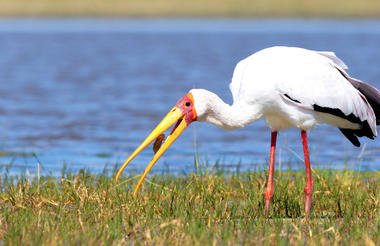
Mokoro Trips
The traditional dugout canoe, locally known as a mokoro, was the mode of transport chosen by the Okavango’s first inhabitants, the Bayei and Banoka people.
Guma Lagoon Camp offers a choice of day trips or overnight camping mokoro trails that take you into the heart of the Okavango. This is an adventurous safari experience not to be missed.
From Guma Lagoon Camp, a 15-minute boat transfer that passes through a narrow meandering channel will get you to the start of your mokoro experience. From here you will get onto a fiberglass or wooden mokoro which can seat two people. The Head Mokoro Poler will then give the group a detailed speech on safety and what to expect on your trip.
You will be poled through the tranquil channels that link the extensive flood plain system to the main river. Water lily beds, palm islands and papyrus stands abound making for the most scenic of experiences. On one of the larger islands you will have time to have your lunch and a guided walk. There is always a chance of seeing large herds of red lechwe bounding through the water and passing elephants feeding amongst the lush wetland vegetation.
After your hearty lunch and walk you will make your way slowly back to the Mokoro station where our motorboats will be waiting for you to take you back to camp.
Okavango Delta – Caprivi, Namibia (345 km) (FB) (camping)
Back on the road today, destination Namibia. Passport formalities completed we travel on the main road through the Mahango Game Reserve to Bagani.
Continue your drive along the Caprivi Strip, Namibia. This strip of land is a long narrow stretch of territory running along Botswana’s northern border. It is a landscape of broadleaf forest with many small communities dotted along our route.
Overnight along the banks of the Kwando River.
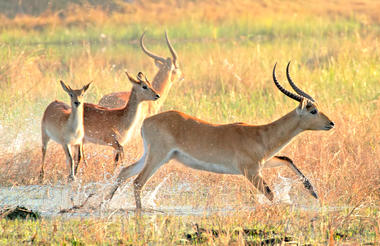
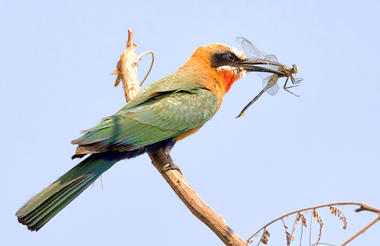
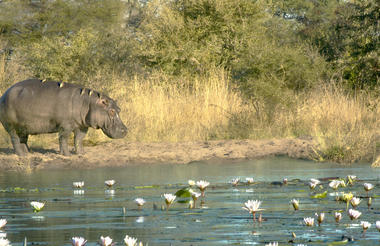
Kwando – Chobe National Park, Kasane, Botswana (230 km) (420 km) (FB) (camping)
Lizauli Traditional Village is a community tourism product that gives visitors a glimpse of life in a traditional village. Amongst the things they show visitors are how to stamp a millet, how grain used to be stored, the chicken house (stantwe), and transportation that were used. You can also see how blacksmiths forge metal tools and knives while an assistant operates the hand-made bellows. Visitors also have the opportunity to interact with a traditional healer.
We transit to Namibia’s easternmost town, Katima Mulilo. A short break here before crossing back across the border into Botswana. The road takes you directly into the world famous Chobe National Park. Chobe has the world’s largest population of African Elephants and the chances of seeing some big game are very good as you transit through the park to the small town of Kasane for overnight on the banks for the Chobe River.
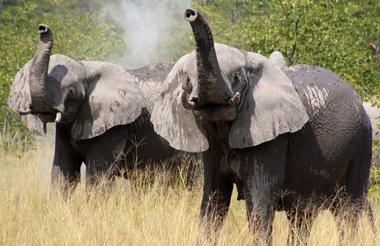

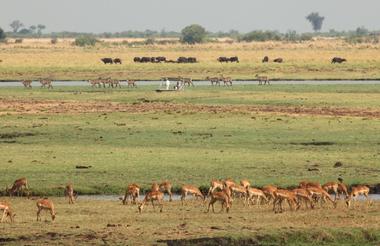
Kasane – Victoria Falls, Zimbabwe (80 km) (BL) (camping)
Our journey today takes us to the Kazangula border, this is the near meeting point of four countries (Namibia, Botswana, Zambia & Zimbabwe). Upon completion of border formalities, we make the short drive to the town of Victoria Falls in Zimbabwe.
Victoria Falls presents a spectacular sight of awe-inspiring beauty and grandeur on the Zambezi River, forming the border between Zambia and Zimbabwe. It was described by the Kololo tribe living in the area in the 1800’s as ‘Mosi-oa-Tunya’ – ‘The Smoke that Thunders’. In more modern terms Victoria Falls is known as the greatest curtain of falling water in the world.
Our campsite is situated right in the middle of Victoria Falls town making it a perfect place to be based with all amenities within walking distance. The Rest Camp is only 2km’s from the falls making it the closest campsite to the Victoria Falls. This afternoon your guide will help you organise the many optional activities available in Victoria Falls. These include white water rafting, bungi jumping, other excursions on the river and scenic flights to mention but a few.
Dinner will be in a local restaurant at your own expense.
NB: All extra activities are subject to availability and are done at the clients own risk and expense.
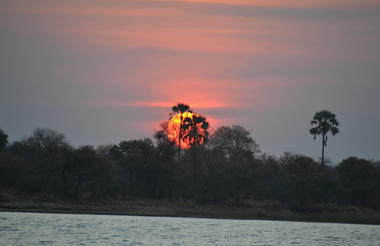

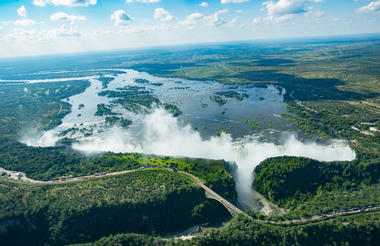
Victoria Falls (B)
This is a free day for you to explore the area or to take part in optional activities. It’s a wonderful opportunity to relax a bit after your trip. For some of you, this will be your final night and what a fantastic place to enjoy your last evening with your group.
Lunch and dinner today, are not included in the price of the trip.
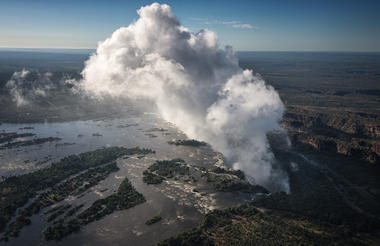
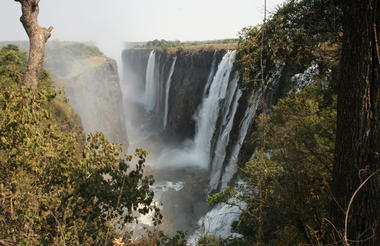

Optional
- Sundowner Cruise
- Helicopter Flight (25min)
- Upper Zambezi Canoe Trip
- White Water Rafting
Sundowner Cruise
The Zambezi River cruise is a superb way to relax and enjoy the beauty of the River. You may have the opportunity to see a variety of game; including hippo, crocodile and elephant in their home environment, as well as enjoy the many different bird species.
Helicopter Flight (25min)
The 25 minute flights depart regularly throughout the day and offer spectacular photographic opportunities. Guests are collected from their hotels 30 minutes prior to their flight departure time and are given a safety talk on arrival at the Helipad, near the Elephant Hills Inter-Continental Hotel.
After take-off on the 28 minute 'Zambezi Spectacular', the helicopter flies over the Victoria Falls, continuing downstream over the Batoka Gorges. Heading back from the Batoka Gorges the flight takes you back over the Falls and the long island on the upper Zambezi towards the National Park, home to a wide variety of wildlife species and then back to the Helipad.
Upper Zambezi Canoe Trip
Take a canoe safari with Wild Horizons and experience everything the stunning and charming Upper Zambezi River has to offer. Depending on the choice of trip, you can get to experience some small but exciting rapids, lunches taken on remote sandbanks, overnighting in the pristine Zambezi National Park, drifting down seldom seen channels and all the excitement of the great African outdoors with its rich diversity of mammal, bird, fish and reptile life.
White Water Rafting
Minimum age: 15 years (At management’s discretion younger children may be accepted if the child is of the right maturity, strength and will fit a lifejacket securely.) Maximum age: There is no maximum age limit; however we retain the right to refuse to take a client who is clearly going to be unable to cope with the rigours of rafting.
Victoria Falls is a mile-long curtain of water that stretches across the glistening basalt rock, erupts into spray, and then thunders into the canyons below. The walls of basalt rock that capture the mighty Zambezi form one of the great river corridors of the world. This is the domain of the Nyaminyami, the River God of the Tonga people and is the ‘highway’ for our rafts. The gorge is over 100 meters deep at the Falls and increases to over 200 meters by the end of a full day raft trip. Despite this rugged terrain, the gorges below the Falls are thick with vegetation and incredibly spectacular.
Arguably the wildest white water in the world, rafting on the Zambezi River is an adrenaline rush not to be missed. The rapids on the Zambezi River are officially defined as “Grade 5” by the British Canoe Union (Grade 6 being commercially un-runnable). Clients should be reasonably fit for this activity, as there is a steep walk into & out of the Batoka Gorge as well as the white water rafting activity itself.
All guests will be collected from their respective hotels and taken to The Lookout Café for their briefing. Please bring your vouchers to check in. Do not bring valuables with you. Please leave all valuables, jewelry and passports at your hotel for safekeeping. We provide a safekeeping facility at check-in, where valuables can be left at your own risk.
Victoria Falls – Rundu, Namibia (700 km) (FB) (camping)
We say farewell to all the travellers flying out today. For those people returning to Windhoek, Namibia it is an early start and a long drive. We are in transit only and will not be stopping to take in the sights along the way. We will traverse the Caprivi Strip and will spend the night near the small town of Rundu in northern Namibia.
Please also note that for clients not returning to Namibia (maybe flying out later), your tent and all equipment, guide and assistant will all be leaving around 06.30 am so you will need to be up and about that morning early. If you would like to have a more leisurely morning, you may want to consider booking into an hotel for this night.
We camp in the grounds of a lodge on the banks for the Okavango River, looking into Angola on the far river bank.
Dinner tonight will be in the restaurant at the lodge and is included in the price of your transfer.
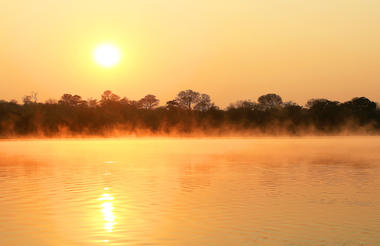
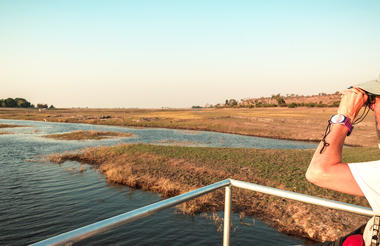
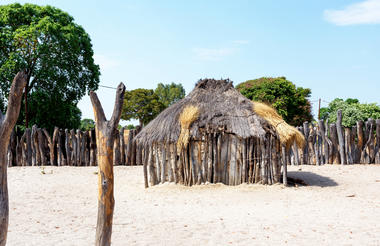
Rundu – Windhoek (800 km) (BL)
Another early start and another long drive. We head south through Kavango Province, down through the towns of Grootfontein, Otjiwarongo and Okahandja before reaching our final destination, Windhoek.
There will be stops at some of the local woodcarving stalls as well as the market at Okahandja before arriving in the city.
You will be dropped off at your accommodation within the city limits of Windhoek.





